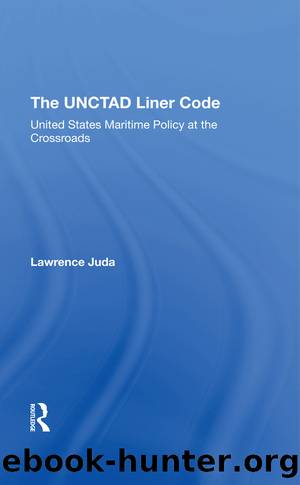The Unctad Liner Code: United States Maritime Policy at the Crossroads by Lawrence Juda

Author:Lawrence Juda [Juda, Lawrence]
Language: eng
Format: epub
ISBN: 9780367296889
Google: zHbByQEACAAJ
Goodreads: 52057185
Publisher: Routledge
Published: 2019-09-13T00:00:00+00:00
Supporters of such equal access agreements maintain that these arrangements, in fact, result in an increase in competition since in their absence cargoes would be reserved wholly to national vessels. Thus, competition is possible only through such arrangements which effectively ameliorate the effect of national cargo reservation laws.[49]
A study conducted by the FMC on the South American trades sought to test the proposition that pooling arrangements automatically result in higher freight rate increases than would be the case in their absence.[50] In fact, what the FMC study did was to compare the experience of the Brazil and Argentine pooled trades with the United States with that of the non-pooled United States trades of the North Atlantic Continental Europe. FMC analysis determined that in the period examined, 1972-1977, and for both inbound and outbound trades, the North Atlantic - Continental Europe trades experienced higher median rate increases than did the pooled trades of Argentina and Brazil.[51] The FMC notes that this study does not prove pools always lead or definitely lead to lower freight rate increases but it does suggest that the contrary assumption, that pooling must always lead to higher freight rates, is certainly questionable.
While the Manalytics study on bilaterals and the FMC study on pooling arrangements in the South American trades are interesting, critics could properly note that they really do not address the question of what freight rates in the Argentine-Brazil trade would be in the absence of pooling arrangements. Such an assessment would have to be based upon assumptions which could vary from expert to expert, thus leading to different conclusions. It is most difficult to compare a policy pursued in a given time period and its effects to an alternative policy and its respective effects since the alternative policy and its impacts can only be hypothesized. Both policies cannot occur at the same time with their consequences neatly laid out for comparative analysis. The comparison of different liner trades and their experience in terms of freight rates is open to question as each trade has its own service requirements, commodity mix, currency problems and a host of other unique characteristics which make comparison between them difficult at best.
For its part, the Kearney: Management Consultants report on bilaterals also could be criticized on the grounds that its conclusions finding comparatively high rates on the Brazil trade relate back to the use of smaller ships and the lack of containerization. These factors, in turn, relate to the less developed transportation and port infrastructure in Brazil as compared to that of the FRG, Japan, and Australia rather than to bilateralism per se. Further, as noted in an FMC study, a primary reason why containerization has been delayed in the United States-Latin American trades is the lack of containerizable goods in the northbound direction. Whereas the goods moved to Latin America in this trade are largely composed of high value, manufactured goods, natural candidates for containerization, those goods moving northbound are mainly low value, primary products such as cocoa, coffee, and cotton which have not traditionally been viewed as suitable for container movement.
Download
This site does not store any files on its server. We only index and link to content provided by other sites. Please contact the content providers to delete copyright contents if any and email us, we'll remove relevant links or contents immediately.
Killers of the Flower Moon by David Grann(3228)
Machine Learning at Scale with H2O by Gregory Keys | David Whiting(2267)
Will by Will Smith(2033)
Guns, Germs and Steel by Diamond Jared(1876)
Borders by unknow(1780)
The Room Where It Happened by John Bolton;(1717)
The Color of Law by Richard Rothstein(1574)
Once Upon a Broken Heart by Stephanie Garber(1472)
Water Rights and the Environment in the United States by John Burch(1414)
Examples & Explanations: Administrative Law by William F. Funk & Richard H. Seamon(1324)
Friends, Lovers, and the Big Terrible Thing by Matthew Perry(1324)
A Short History of War by Jeremy Black(1295)
Pharmacy Practice and The Law by Richard Abood(1252)
HBR's 10 Must Reads 2022 by Harvard Business Review(1251)
That Every Man Be Armed by Stephen P. Halbrook(1236)
The Strength In Our Scars by Bianca Sparacino(1234)
The Guarded Gate by Daniel Okrent(1218)
515945210 by Unknown(1205)
Injustices by Ian Millhiser(1197)
